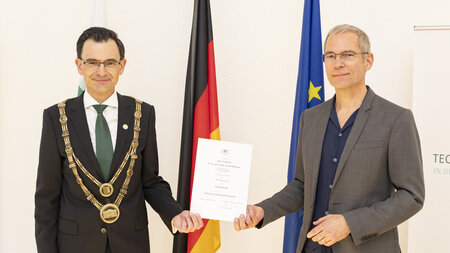Dr. Clemens Bombach

-
Telefon:+49 371 531-30269
-
E-Mail:
-
Adresse:Reichenhainer Straße 31/33, 09126 Chemnitz
-
Raum:
-
Sprechzeiten:Nach Absprache.
Ich bin Postdoktorand an der Professur Prädiktive Verhaltensanalyse, wo ich menschliches Verhaltens mittels Techniken der kognitiven Modellierung und des maschinellen Lernens studiere. Zuvor habe ich auf dem Gebiet der mathematischen Kontrolltheorie gearbeitet, mit Schwerpunkt Beobachtbarkeitsungleichungen.
Forschungsinteressen
- kognitive Modellierung
- maschinelles Lernen
- Kontrolltheorie
CV
- seit 2025: wissenschaftlicher Mitarbeiter, Professur Prädiktive Verhaltensanalyse, TU Chemnitz
- 2024: Promotion in Mathematik (Dr. rer. nat.)
- 2016 - 2025: wissenschaftlicher Mitarbeiter, Professur Analysis, TU Chemnitz
- 2009 - 2016: Mathematikstudium, TU Chemnitz
Projekte
- 2025 - 2027: DfG-Projekt Systeme, Algorithmen und kognitive Modelle zur Vorhersage individueller menschlicher Schlussfolgerungsprozesse (PREDIR)
Publikationen
- C. Bombach: Unique Determination of a singular potential from boundary data.[arXiv:2502.15319]
- C. Bombach, M. Tautenhahn: A Logvinenko-Sereda theorem for vector-valued functions and application to control theory, Z. Anal. Anwend. (Online first), 2025. [DOI: 10.4171/zaa/1794][arXiv:2401.09159]
- C. Bombach, D. Gallaun, C. Seifert, M.Tautenhahn: Observability and null-controllability for parabolic equations in Lp-spaces. Mathematical Control and Related Fields, 2023. [DOI: 10.3934/mcrf.2022046][arXiv:2005.14503]
- C. Bombach, F. Gabel, C. Seifert, M.Tautenhahn: Observability for non-autonomous systems. SIAM Journal on Control and Optimization, 61(1), 313-339, 2023. [DOI: 10.1137/22M1485139][arXiv:2203.08469]
Lehre (Auswahl)
- SS 2025: Übung Analysis partieller Differentialgleichungen
- WS 2025: Übungen Analysis für das Lehramt, Höhere Mathematik III (MB)
- SS 2024: Übungen Analysis partieller Differentialgleichungen, Höhere Mathematik IV (Informatik, E-Technik, Physik)
- WS 2024: Übungen Funktionentheorie, Höhere Mathematik III (Informatik, E-Technik, Physik)
- davor diverse andere Übungen im Bereich Analysis/Höhere Mathematik






